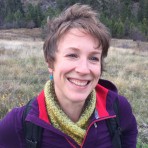Poetry and Orgasms: Some Critical and Creative Reflections About New Ways Geographers Might (Re)Think the Anthropocene and Geophilosophy
Poetry and Orgasms: Some Critical and Creative Reflections About New Ways Geographers Might (Re)Think the Anthropocene and Geophilosophy
Categories: Lectures and Seminars | Intended for Anyone

A220 Loeb Building
1125 Colonel By Dr, Ottawa, ON
Contact Information
Natalia Fierro Marquez, 613-520-2600 x 2560, natalia.fierromarquez@carleton.ca
Registration
No registration required.
Cost
Free
About this Event
Host Organization: Geography and Environmental Studies
More Information: Please click here for additional details.
The Founders Seminar Series welcomes Dr. Sarah de Leeuw to present “Orgasmic Poetic Spaces: Eco-Erotic Poetry and Geographers in The Anthropocene”
Abstract:
This paper - an assemblage of poetic interludes and theoretical discussions - brings together a series of conceptual terrains garnering increased attention by geographers: the creative re-turn and geohumanities, the Anthropocene, and geophilosophy. Extending Sarah Whatmore’s (2006) call for “new ways of approaching the vital nexus between the bio (life) and the geo (earth), or the ‘livingness’ of the world in a context in which the modality of life is politically and technologically molten,” I advocate for poetic practices that are embodied, physically moving, and explicitly written to be sexually felt and experienced. As a geographer and feminist poet interested in the ‘rebodying’ trends of feminism (Wilson 2015), I offer a critique of ecopoetry – a genre I propose must be expanded in important ways before it reaches its full potential for geographers attending to ethical and political issues of the Anthropocene and geophilosophy. Specifically, I argue the genre must attend more to ‘blood and guts’ (Birke 2000) and the ‘messy fleshy’ stuff (Katz 2001) of especially women’s lives. I draw on Annamarie Jagose’s (2013) concept of orgasmology, a queer feminist theoretical framework with enough “elasticated semantic reach”(Jagose 2013, pg. 38) to tackle the absence of radical sex/uality in critical leftist social and ecological theories, including ecopoetics. In conclusion, then, and applying Jagose’s ideas to poetry and geography, I argue that erotic creative works, firmly grounded in place and ecology, may offer new ways of writing and thinking about geophilosophy and the Anthropocene.
Keywords: The Creative Re/turn, Geohumanities, the Anthropocene, Geophilosophy, Feminism, Poetry, Eros, Orgasm
Bio:
Sarah de Leeuw is the author of five literary books (one forthcoming, 2017) and the co-editor of two academic texts (including the recent 2015 Determinants of Indigenous Peoples Health in Canada with Canadian Scholars' Press). She is a two-time recipient of CBC’s Literary Prize for creative non-fiction and is the 2013 Dorothy Livesay Award winner for Geographies of a Lover, named the best book of poetry in British Columbia that year. She is a creative writer and geographer who works in a faculty of medicine where she teaches and undertakes research on medical humanities and health inquiries, especially between Indigenous and non-Indigenous peoples and particularly as they are geographically determined. Her poetry, non-fiction, and academic writings appear in numerous journals and anthologies - including The Annals of the American Association of Geographers, cultural geographies, The Canadian Family Physician, Emotion, Space and Society, ARC Poetry, The Malahat Review, and The Canadian Geographer. Her recent (2014) creative non-fiction essay (“Soft Shouldered”) about murdered and missing Indigenous women along Highway 16, published in the literary journal PRISM International, was awarded two Western Magazine Awards, including Gold Medal for Best Essay of the Year. Sarah de Leeuw currently holds Northern British Columbia's only Michael Smith Foundation for Health Research (MSFHR) Partnered Scholars’ Award, the focus of which is how creative arts and medical humanities intersect with health and well-being of peoples in marginalized geographies. Having grown up and spent most of her life in Northern BC, including Haida Gwaii, she now lives in both Prince George and Kelowna.